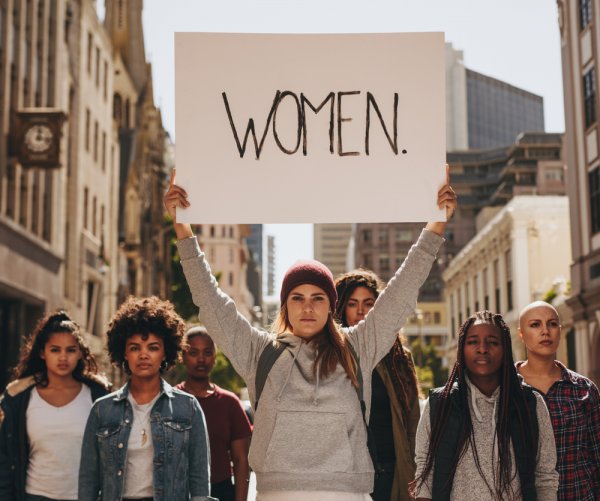The issue
Political scientists and practitioners have long been troubled by political violence, defined as the use of force, or threatened use of force, to achieve political ends. In a bid to gain political power, perpetrators may issue bomb threats, or gather in menacing ways in front of polling stations, to deter certain citizens from voting. To gain their preferred policy outcomes, perpetrators may intimidate political candidates and officeholders, pressuring them to make decisions opposed to their personal preferences as well as those of voters. Political violence thus poses serious threats to democracy, with actors prevailing via fear of injury or death, undermining fair voting procedures and rational and inclusive political deliberation.
Despite a large literature on this topic, gaps in existing approaches to understanding political violence have become increasingly evident in recent years. Some of the earliest feminist moves to expand this agenda came in the 1990s, with activist efforts to recognise rape as a tool of war. Prior to this, rape was a widespread but largely unacknowledged aspect of political conflict, viewed simply as part of a broader landscape of brutality, meriting no particular attention of its own.
This changed during the international tribunals on Rwanda and the former Yugoslavia, during which rape came to be understood as a crime of war (1996), violating the rules and customs of war; as a crime of genocide (1998), seeking the destruction of a group in whole or in part; and as a crime against humanity (2001), constituting a fundamental violation of human dignity. These advances highlighted the need to adopt broader definitions of ‘violence,’ as well as to recognise that the motives and means of political violence may be deeply gendered.

Feminist interventions
Attention to gender and political violence has continued to grow in the intervening years, inspiring a large literature and series of policy interventions related to women in conflict and post-conflict contexts. At the same time, a parallel and sometimes intersecting new area of interest has emerged, focusing on violence perpetrated against politically active women.
The issue surfaced organically in different places: in conversations among locally elected women in Bolivia in the early 2000s, who began to theorise what they called ‘political violence and harassment against women’; in Asian networks of political women concerned in the mid-2000s to map and address the problem of ‘violence against women in politics’; and among local and international activists in Kenya in the late 2000s, who observed and sought to combat ‘electoral gender-based violence’.
The United Nations General Assembly first recognised it as a problem in 2011, calling for zero tolerance for violence against female candidates and elected officials
Over the last five years, international practitioners have increasingly picked up on this issue. The United Nations General Assembly first recognised it as a problem in 2011, calling for zero tolerance for violence against female candidates and elected officials. After several years of research, UN Women and UNDP published a programming guide for tackling violence against women in elections in 2017. The UN Special Rapporteur on Violence against Women is preparing a special report on this issue, to be presented to the General Assembly in late 2018.
Actors outside the UN system have also been very active in collecting data and devising solutions to combat violence against women in politics. In 2016, the National Democratic Institute launched the #NotTheCost campaign, developing a suite of tools to observe violence against women in elections, address violence inside political parties, and document violent incidents against politically active women. That same year, the Inter-Parliamentary Union undertook the first global study of sexism, violence, and harassment against female members of parliament. And in 2017, following consultations across Latin America, the Inter-American Commission of Women published a model law to prevent, punish, and eradicate violence against women in political life.
Academic research on this topic is a good example of how gender innovation can sharpen the conceptual tools available in the social sciences. On the one hand, it shows how applying a gender lens requires rethinking traditional approaches to studying political violence, in terms of definitions, motives, and forms of violence. On the other hand, it problematises elements of the political landscape that are often normalised, highlighting how violence may be used against women specifically as a means to deter their political participation.
Definitions of political violence
Existing datasets on political violence tend to limit their focus to acts of physical violence, which can be observed and are often recorded in hospital and other types of state records. Acts of a physical nature, however, do not exhaust the spectrum of activities that can be identified as instances of ‘violence.’ Traditional theories of electoral violence recognise as much, mentioning intimidation (psychological violence) and property damage (economic violence) as tactics used to deter voter participation and influence policy-making. The result is a disconnect between theories of political violence and the data used to analyze its prevalence and impact.
Feminist research, in contrast, tends to adopt a more comprehensive definition of violence, emphasising a continuum of violent behaviors
Feminist research, in contrast, tends to adopt a more comprehensive definition of violence, emphasising a continuum of violent behaviors. International and national frameworks thus enumerate a number of kinds of violence against women. Article 2 of the UN Declaration on the Elimination of Violence against Women (1993) identifies three types: physical, sexual, and psychological violence. Economic violence is added as a fourth type in Article 3 of the Council of Europe’s Istanbul Convention (2011). According to World Bank data from 189 countries, all four forms of violence appear in national legislation, albeit with varying degrees of recognition: physical violence is criminalised in 137, psychological violence in 134, sexual violence in 106, and economic violence in 86.
Feminist insights inform the emerging academic and practitioner literature on violence against women in politics. Data collected by the Inter-Parliamentary Union for its 2016 issues brief illustrates why an expanded approach is necessary for understanding the full extent of this problem. While one-quarter of the female parliamentarians interviewed had experienced physical violence during the course of their political work, more than 80 per cent stated they had suffered psychological violence, one-third some form of economic violence, and one-fifth some type of sexual violence. Physical aggression thus reflects only one – and not even the most common – form of violence experienced by female politicians.
Motives of political violence
The aim of political violence, as traditionally conceptualised, is to interfere in some way in the political process. As such, its democratic costs are well-recognised. Until recently, acts of violence against women have not been similarly problematised. Despite violating values of equality by seeking to put women ‘in their place,’ instances of gender-based violence tend to be ‘naturalised,’ and thus viewed as outside the arena of public concern, due to cultural norms regarding gender hierarchy. The result is continued indifference on the part of both state and society, even as more countries adopt legislation addressing violence against women.
Violence against women in the political sphere is even less recognised as a ‘problem,’ with many actors – including political women themselves – considering violence as simply the ‘cost of doing politics’
Violence against women in the political sphere is even less recognised as a ‘problem,’ with many actors – including political women themselves – considering violence as simply the ‘cost of doing politics.’ Yet such behaviors also have serious democratic implications, violating women’s political rights while also eroding the political rights of the public at large. Gender stereotypes, as argued by feminist historians and political theorists, are rooted in tendencies to associate men with the public sphere of politics and women with the private sphere of the home. Feminist psychologists show that perceived violations of appropriate gender roles give rise to hostility against women seeking to participate in politics, tainting assessments of their qualifications and performance. These dynamics interfere in democratic processes by silencing women’s voices in political debates, as well as by undermining citizens’ rights to vote for and be represented by female leaders.

Psychological violence is perhaps the most common form of violence against women in politics. Earlier this year, Greens Senator Sarah Hanson-Young was the subject of lewd comments from Senator David Leyonhjelm.
Means of political violence
Politically active women experience physical violence, in the form of assassinations, kidnappings, and beatings. The tangible nature of these acts makes them the most widely recognised and least contested forms of violence against women in the political sphere. However, they tend to be relatively rare, with perpetrators opting for ‘less costly’ means of violence before escalating to physical attacks. Reducing violence against women in politics to these types of acts can thus create a misleading impression as to the nature and prevalence of aggression and intimidation directed at politically active women.
Psychological violence is perhaps the most common form of violence against women in politics. It can occur inside and outside of official political settings and include death and rape threats, as well as sexist heckling and name-calling, both in person and via social media. Awareness of sexual violence has expanded in the wake of the #MeToo movement, with growing number of female political actors disclosing their experiences with sexual assault and sexual harassment in connection with their political work. Economic violence encompasses harms against women’s property, like defacing their campaign materials or their personal possessions, as well as systematically denying them resources made available to their male counterparts. Semiotic violence, less recognised than the four other types, is perpetrated through degrading images and sexist language intended to sexually objectify and symbolically annihilate women as political actors.
Impact
Research and activism to address violence against women in politics is still in its early stages. Dialogue and partnerships across the scholar-practitioner divide, however, have been vital for advancing work on this topic – raising awareness, collecting data, and devising solutions to the problem. A recent example is the expert group meeting convened in March 2018 by the UN Special Rapporteur on Violence against Women, bringing together academics, politicians, and practitioners to share experiences of violence as well as emerging frameworks for understanding and tackling it on a global scale. Consensus seems to be developing around the notion that violence against women in politics is a serious threat to democracy, human rights, and gender equality around the world – it cannot simply be dismissed as ‘politics as usual’ or the ‘normal cost’ of political participation.
Feminist academic research on this topic is both intellectually and politically important
Feminist academic research on this topic is thus both intellectually and politically important. It challenges reigning concepts of political violence, suggesting that existing frameworks need to be broadened to encapsulate a broader range of activities posting a threaten to both electoral and personal integrity. This requires, empirically and methodologically, revisiting traditional strategies of data collection and analysis. In so doing, this work opens up new frontiers for exploring resistance to women’s political participation and leadership. Politically, this work can play a vital role in shaping efforts to recognise and address violence against women in politics, providing arguments and conceptual frameworks to advance these debates. Feminist expertise, no doubt, will be indispensable for devising strategies to ensure that women can participate in politics fully, freely, and without interference.
This article was first published as part of the ‘Gendered innovation in the social sciences’ project at the Australian National University, and has been reproduced here with permission. The project, as part of the ARC funded ‘Gendered Excellence in Social Sciences’ research, collects case studies of how the understanding of fundamental questions has been improved by the application of a gender lens.




